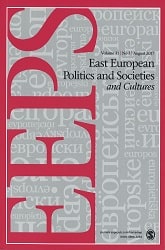The “Children of Crisis” Making Sense of (Post)socialism and the End of Yugoslavia
The “Children of Crisis” Making Sense of (Post)socialism and the End of Yugoslavia
Author(s): Ljubica SpaskovskaSubject(s): Political history, Government/Political systems, Transformation Period (1990 - 2010), Sociology of Politics, Politics of History/Memory
Published by: SAGE Publications Ltd
Keywords: Yugoslavia; socialism; generation; memory;
Summary/Abstract: The article traces certain mnemonic patterns in the ways individuals who belonged to the late-socialist Yugoslav youth elite articulated their values in the wake of Yugoslavia’s demise and the ways they make sense of the Yugoslav socialist past and their generational role a quarter of a century later. It detects narratives of loss, betrayed hopes, and a general disillusionment with politics and the state of post-socialist democracy that appear to be particularly frequent in the testimonies of the media and cultural elites. They convey a sense of discontent with the state of post-Yugoslav democracy and with the politicians—some belonging to the same generation—who embraced conservative values and a semi-authoritarian political culture. The article argues that an emerging new authoritarianism and the very process of progressive disillusionment with postsocialist politics allowed for the emergence and articulation of such alternative, noninstitutionalized individual memories that, whilst not uncritical of the Yugoslav past, tend to highlight its positive aspects.
Journal: East European Politics and Societies
- Issue Year: 31/2017
- Issue No: 03
- Page Range: 500-517
- Page Count: 18
- Language: English
- Content File-PDF

